 Naked Neck
Naked Neck
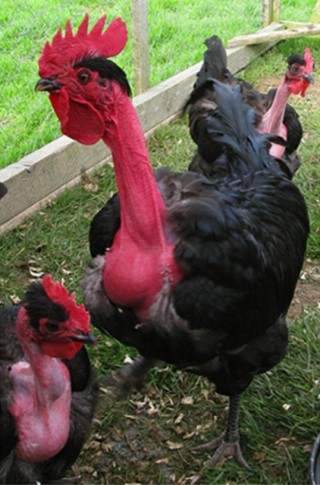 Naked Neck
chickens (also known as Transylvanian Naked Necks or Turken) are a breed of
chicken that is naturally devoid of feathers on its neck and vent. They originally
are from Transylvania and were largely developed in Germany.
Naked Neck
chickens (also known as Transylvanian Naked Necks or Turken) are a breed of
chicken that is naturally devoid of feathers on its neck and vent. They originally
are from Transylvania and were largely developed in Germany.They are often referred to as Turkens because of the mistaken idea that they were a hybrid of a chicken and a turkey. Naked Neck chickens are fairly common in Europe today, but are rare in North America and very common in South American.
The naked neck trait is dominant and is fairly easy to introduce into other breeds. There are other breeds of naked necked chicken, such as the French naked neck or Italian Naked neck, which is often confused with the Transylvanian.

 Nankin Bantams
Nankin Bantams
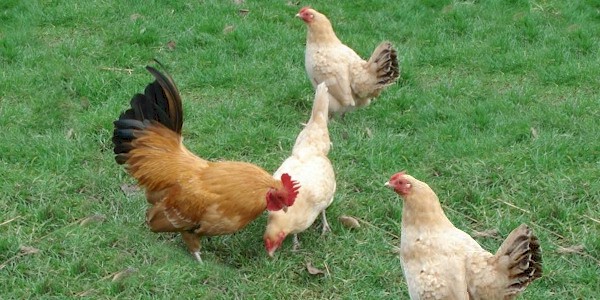 Nankin Bantams, or just Nankins, are a British bantam
chicken. They are a true bantam, a naturally small breed with no large
counterpart from which it was miniaturized. They yellowish buff colored, and
the name is thought to derive from the color of Nankeen cotton from China.
Nankin Bantams, or just Nankins, are a British bantam
chicken. They are a true bantam, a naturally small breed with no large
counterpart from which it was miniaturized. They yellowish buff colored, and
the name is thought to derive from the color of Nankeen cotton from China.There are two varieties of Nankin chickens, differentiated by comb type; the single comb Nankin has a large comb with five points, and the rose comb has a medium size one ending in a single point. All Nankins come in a single color, with buff on the body and black tails. The golden hue is deeper and more lustrous in males, and they have the longer sickle feathers common in cocks. Their beaks are a light horn color, and legs are slate blue.
...

 New Hampshire
New Hampshire
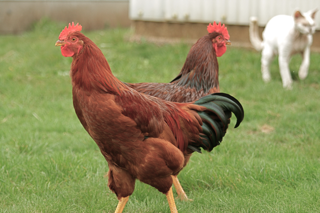 New Hampshire,
or New Hampshire Red, chickens were developed to be quick with eggs and heavy
with meat. They tend to produce quite a lot of brown eggs each year. They
mature quickly, meaning they can be fattened up and cooked much sooner than
other breeds.
New Hampshire,
or New Hampshire Red, chickens were developed to be quick with eggs and heavy
with meat. They tend to produce quite a lot of brown eggs each year. They
mature quickly, meaning they can be fattened up and cooked much sooner than
other breeds. New Hampshire Reds are very easy to tame and are generally very friendly. They are laid back and content to just lay eggs and be raised for dinner. Despite being so relaxed, they are quite active and do well in a nice open space where they can run about and forage. When kept with their same breed, the issue of aggression doesn''t generally come up.
New Hampshire Reds are big birds with their distinctive red color with bluish or black feathers on the end of the ta ...

 Norfolk Grey
Norfolk Grey
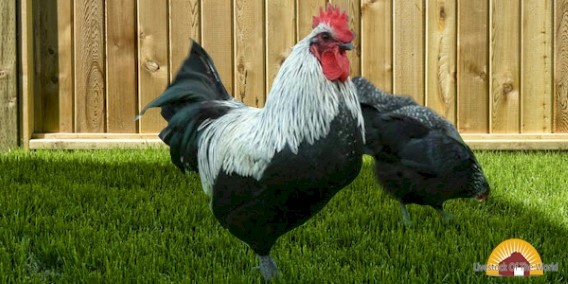 Norfolk Grey
chickens are a dual-purpose that originated in Norfolk, England, around 1910.
Norfolk Grey
chickens are a dual-purpose that originated in Norfolk, England, around 1910. They were originally created by Frederick W Myhill of Hethel, Wymondham under the name Black Maria. It is believed that he used Birchen English Game and possibly Duckwing Leghorns. The game inclusion would account for the excellent meat ability and the Leghorn for the laying ability.
During the First World War, they were allowed to free range while Myhill had departed for military service. On his return, he discovered that the birds had cross bred with other breeds and the strain had to be recreated. In 1925, Myhill applied to the Poultry Club of Great Britain in 1925 to have the name changed to Norfolk Grey as th ...

 Norwegian Jaerhones
Norwegian Jaerhones
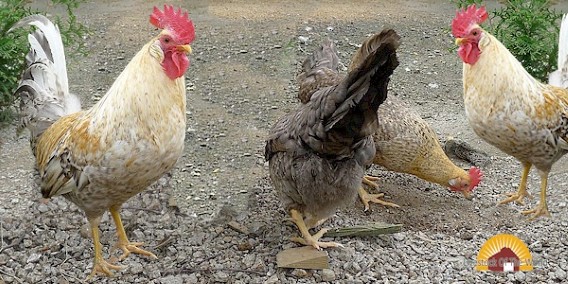 Norwegian Jaerhones are auto-sexing chickens developed in the 1920s from local breeds in the Jæren district of Norway.
Norwegian Jaerhones are auto-sexing chickens developed in the 1920s from local breeds in the Jæren district of Norway. Jaerhones were the principal chicken breed of Norway until imports of foreign breeds began in the nineteenth century. They were selectively bred at the state-controlled breeding station at Bryne in Jaeren from its establishment in 1916 until it closed in 1973. Breeding stock were then transferred to the state agricultural college at Hvam, Nes.
They come in two color varieties: dark brown and yellow, and light brown and yellow. They have a single comb and their beak and legs are bright yellow.
A miniature version with the same two color varieties was approved in 1994.
Jaerhones ...
